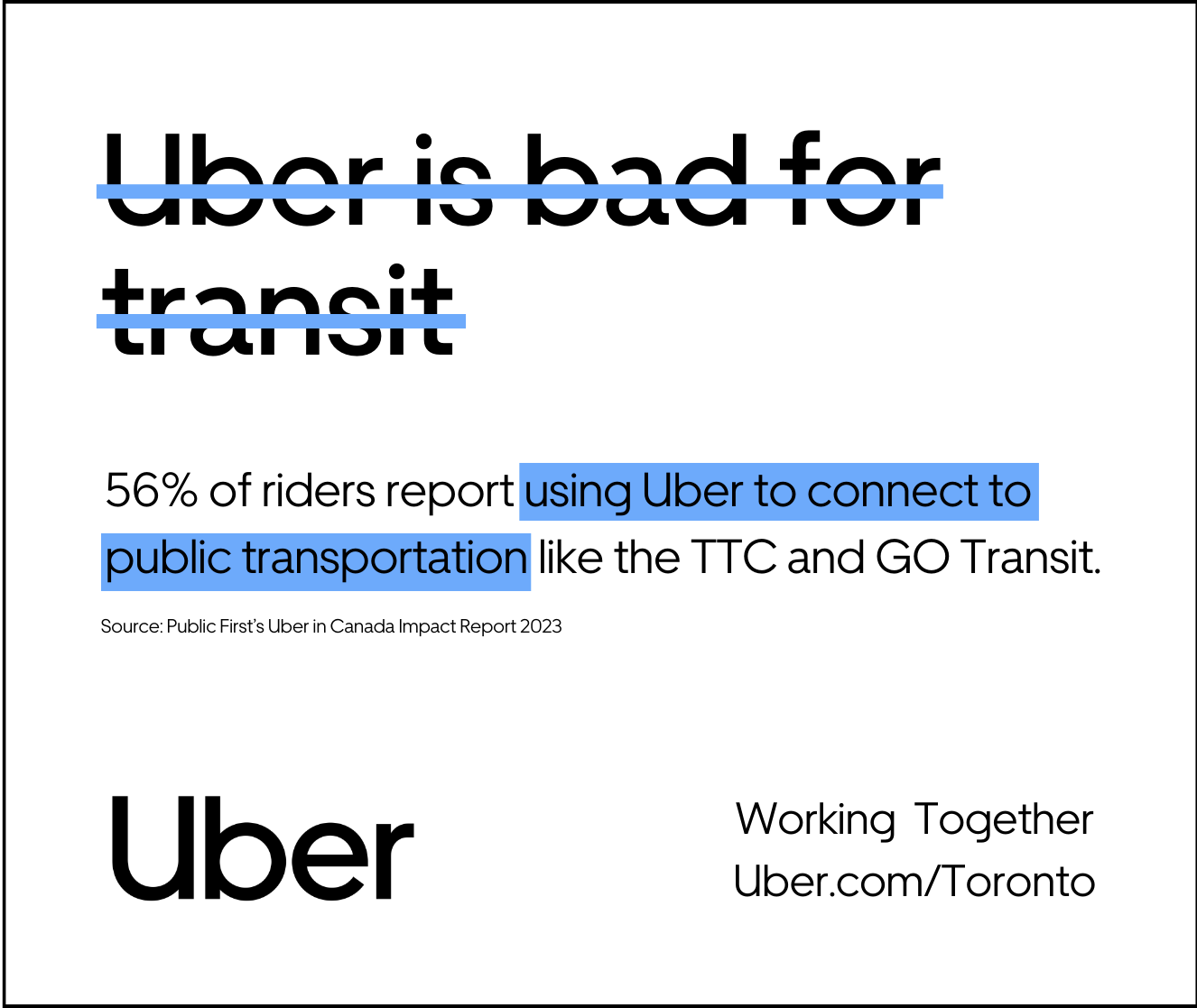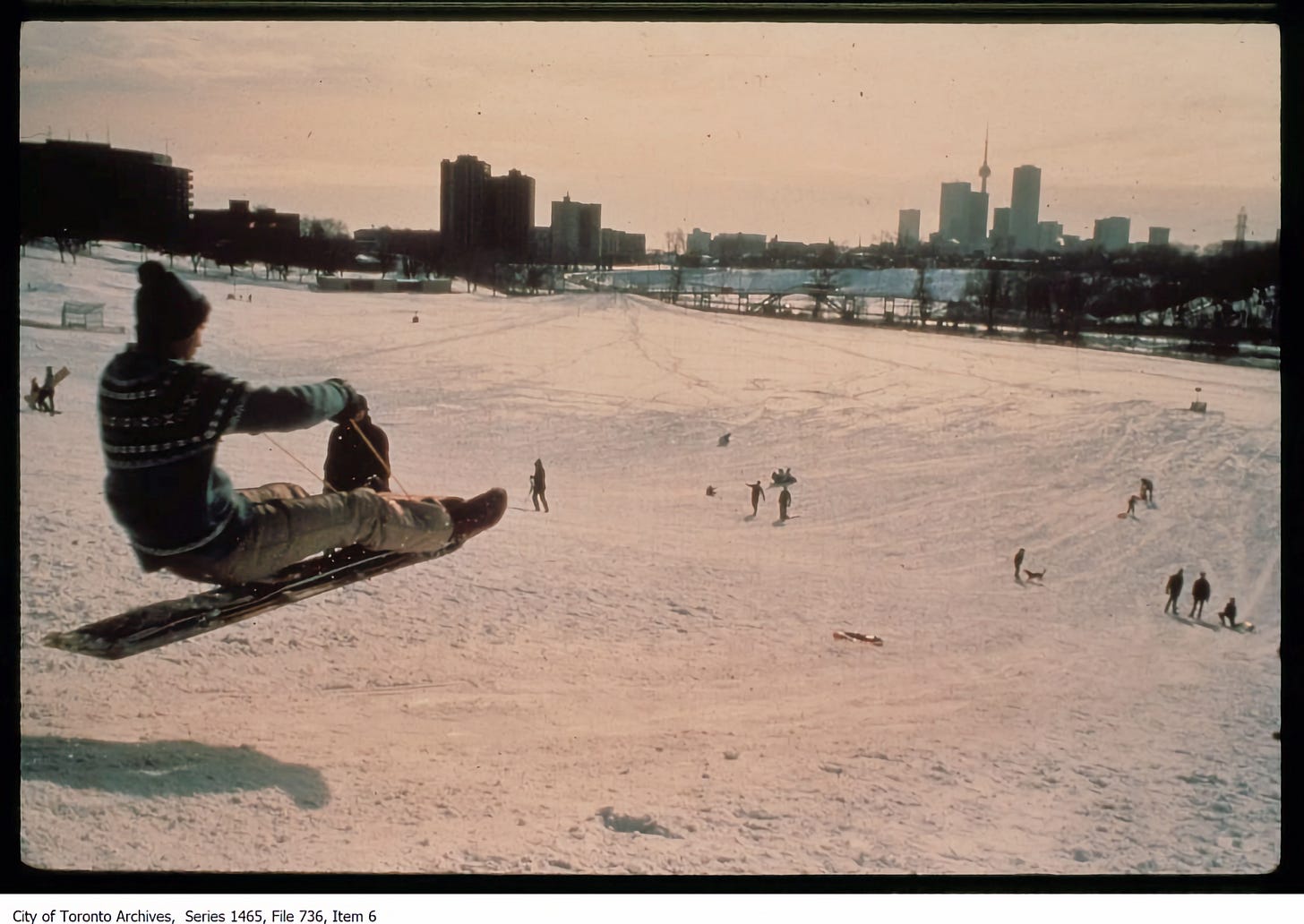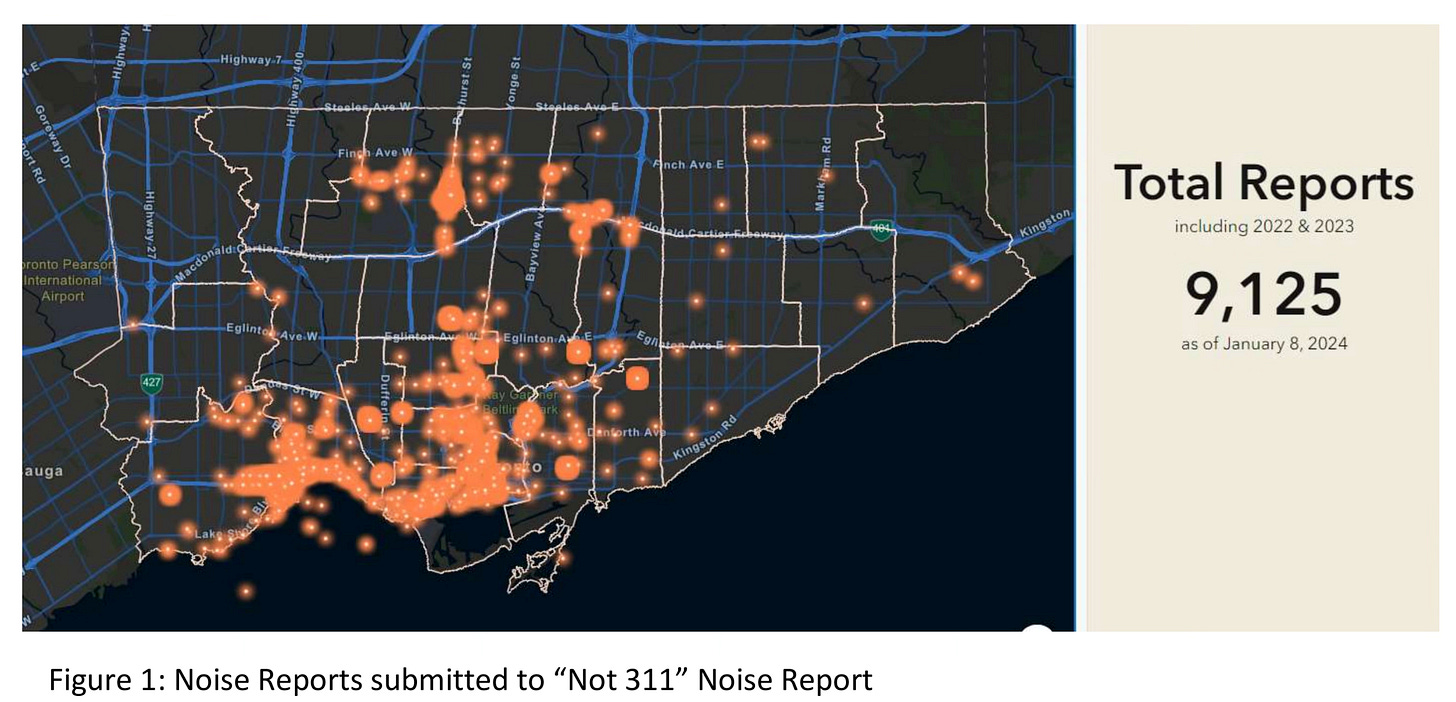Council toboggans toward budget time
It's all downhill from here. The Week at City Hall for February 5 through February 9, with Council debates on noise, sledding and more.
Hey there! Happy Groundhog Day. I’ll wish you the same tomorrow. And the next day and the next day and the next day.
Some news for the week:
Mayor Olivia Chow has lowered the budget's combined residential property tax increase from 10.5% to 9.5%.
The federal government has announced money to support refugees in Toronto shelters. How much money? TBD. But Chow says it’s enough that an additional tax increase to pay for shelter costs is off the table — for now.
Chow’s budget includes funds for the dedicated busway to temporarily replace the Scarborough RT. Her budget does not include more funds for the police beyond the increase in the staff-recommended budget.
I’ll have more on the budget presented by Mayor Olivia Chow in next week’s issue. But until then, you can read my thread of complete coverage of the announcement on Mastodon.
Speaking of next week, there’s a Council meeting! Think of it like an appetizer meeting before the special budget meeting the following week. The agenda includes things like the noise bylaw, dedicated bus lanes and, of course, tobogganing. Let’s push off and start sliding down together. — Matt Elliott
This issue of City Hall Watcher’s The Week at Toronto City Hall is sponsored by:
Monday, February 5
♿️ The Toronto Accessibility Advisory Committee meets via Video Conference at 9:30 a.m.👀 Watch Live: YouTube LivestreamSCOOT OVER: Their agenda includes a presentation update on staff’s work to develop a “micro-mobility strategy” with rules and regulations for things like e-bikes, cargo bikes, and e-scooters. Also: pedal pubs. (But no booze allowed in Toronto, obviously.)
The stop at the Accessibility Committee is part of collecting feedback ahead of a report due in May that’ll include a recommendation on whether to legalize e-scooters for some kind of pilot project. The committee has previously supported a ban on e-scooters with no exceptions.
AND ALSO:
The Committee will also get a presentation from staff about the work City Hall has been doing to make sidewalks and bike lanes more accessible.
Over 4,261 storefronts in Toronto have at least one step at their entrance and aren’t accessible to wheelchair users. Staff recommend that temporary ramps be allowed without permits, subject to placement guidelines developed by staff to ensure that there’s still room on the sidewalk for people passing by.
Tuesday, February 6
🏟️ Toronto City Council meets at City Hall at 9:30 a.m.👀 Watch Live: Council Chamber, YouTube LivestreamSLIP SLIDING AWAY: There’s no snow in the forecast, but Council will have a wintery debate anyway. Councillor Brad Bradford has been doing the media rounds lately, responding to reports that the City had posted “no tobogganing” signs at several parks. The signs encouraged people to only use their sleds at one of 27 parks where the hills have been certified safe for sledding.
These kinds of stories, that position a nanny-state bureaucracy as a barrier to fun, always get a ton of play but they’re also generally more complex than presented.
In this case:
Council never voted to ban tobogganing. Mayor Olivia Chow did not decide to ban tobogganing. These signs were a decision that was made by City staff with no political involvement, consistent with a bylaw passed in 2004.
The City had no enforcement strategy for enforcing the message on the signs.
City staff are incentivized to err on the side of safety because of “Joint & Several Liability,” which means municipal governments can potentially be held liable for up to 100% of damages in court awards even if they’re found to be just 1% liable.
Toronto is hardly unique in its approach to tobogganing. Of the top ten largest Canadian municipalities, Calgary, Ottawa, and Hamilton have the same policy, with blanket prohibitions except for a select number of hills.
But still, none of that makes the status quo a sensible approach.
For one thing, there’s not a lot of evidence that “no tobogganing” signage makes much of a difference in terms of liability. For another, research says tobogganing is a pretty darn safe winter activity. Based on this data from the University of Alberta, hockey is about 15 times more dangerous. And for injuries that result in extended hospitalization, no winter activity is more dangerous than… curling? Hurry hard to believe.
So it’s not really a big deal that Bradford, with support from friend/enemy/frenemy Mayor Olivia Chow, has brought a motion that’ll change the City policies so that “no tobogganing” signs are replaced with signs “warning about the potential risks associated with tobogganing.” It’ll also mandate that staff seek approval from the local Community Council before instituting any future bans, reinstall hay bales on hills that used to have hay bales, and ask the province to change the whole “Joint & Several Liability” thing.
It should pass. But I still reserve the right to think this whole saga was pretty silly.
Also, I’d sure love to know how much the City has spent and will spend on making toboggan-related signs.
MAKE SOME NOISE: Years in the making, Council will debate a report on the implementation and enforcement of Toronto’s Noise Bylaw.
The report recommends a few tweaks to the bylaw, including lowering decibel limits, considering vibration when determining whether a noise is “unreasonable and persistent,” and adding musical instruments to the list of things that can make unreasonable and persistent noise.
The challenge remains enforcement.
Independent noise complaint data collected via a survey by No More Noise Toronto found vehicle noise was the biggest noisy annoyance. The complaints were clustered along the waterfront west, where the Gardiner and Lake Shore Boulevard make for some speedy late-night driving.
That differs wildly from City data, where “amplified sound” is the biggest driver of complaints. That’s because, until June of last year, Municipal Licensing & Standards didn’t even bother registering complaints about noise from moving vehicles, arguing that it was outside their jurisdiction.
Staff say Toronto Police have made a “commitment” to support enforcement of vehicle noise, like cracking down on car owners who have installed mods in an attempt to turn their lives into an instalment of the Fast & Furious franchise.
But there’s good reason for Council to be skeptical that the police will do a whole lot to aid with enforcement. One alternative? Automation. “Noise Radar” technology, which works like photo radar but for noisy cars, is showing some promise. New York City recently opted to expand the technology. Since Toronto does tend to enjoy comparing itself to New York, I wonder if we’ll see a push from Council to follow their lead.
Some councillors may also want to further regulate noise from overnight garbage pick-up. Waste companies have been lobbying City Hall to stick with a staff recommendation that exempts trash trucks from any decibel limits, but Councillor Dianne Saxe, for one, thinks there ought to be some rules.
FOREIGN BUYER TAX: Despite a letter from the Building Industry & Land Development Association (BILD) urging a deferral to allow for stakeholder consultation, Mayor Olivia Chow’s Executive Committee last week pushed forward with a plan to start implementing a 10% tax on foreign buyers of Toronto real estate.
Combined with the provincial foreign-buyer tax, the move would result in affected real estate buyers in Toronto paying close to 40% of the purchase price in non-resident speculation taxes (NRST) and land transfer taxes.
Council will be asked to green light implementation for January 1, 2025. It’ll make between $10 million and $15 million a year for City Hall — the actual amount largely dependent on whether Prime Minister Justin Trudeau maintains a ban on foreign buyers (with a few exceptions) beyond this year.
GIVE ME SHELTER: Council will also consider an update on the strategy to gradually transition away from the temporary shelter hotels leased during COVID-19.
Some hotel sites have been closed or are closing, while others will see medium-term lease extensions to keep space available as the City works to build new shelters.
The details of the leases are in a confidential attachment, but a letter from PC MPP Aris Babikian suggests the lease for the Delta Hotel at 2035 Kennedy Road is recommended for extension. Babikian isn’t happy about this, arguing that the presence of the shelter has meant residents “have been living in a nightmare.”
BUS LANES: A dedicated bus lane along Steeles Avenue West is back on the menu. After the project vanished from the list of next-stage routes under the RapidTO program, a motion from Councillor Josh Matlow at Executive Committee restored it. Steeles West joins Finch East, Dufferin Street, and Lawrence East as routes recommended for roadway-specific studies, pending Council approval.
Support for Steeles came from a bunch of transit advocates, as you’d expect, but also some big developers. Reps from Starlight, Tenblock and First Capital REIT all wrote letters in support.
AND ALSO:
Council will consider a pair of reports about the Imagination, Manufacturing, Innovation & Technology Program that offers tax breaks for non-residential buildings, as an incentive to get them to locate in Toronto. One report recommends a significant redesign of the program, scaling it back so that office buildings are no longer eligible. A second report recommends rejecting an IMIT application from Cadillac Fairview for commercial buildings in the East Harbour Development.
Following some resignations in protest of the name-change process, Council will consider a new slate of appointees to the Yonge-Dundas Square Board of Directors, which will soon be rechristened the Sankofa Square Board. Gideon Arthurs, Executive Director of Soulpepper Theatre Company, is recommended for the chair role.
Staff recommend that Council switch to processing tickets from photo radar and red-light cameras using the same Administrative Penalty System used for parking tickets. This should generally result in much quicker ticket processing.
A motion from Councillor Dianne Saxe would direct staff to do more to make sure bike lanes are clear of snow. Helpful if it, you know, actually snows again. I’m starting to have doubts. The agenda also includes a recommendation that will make people eligible for the TTC Fair Pass discount also eligible for a discount for Bike Share membership. And a report recommending upgrades to the bike lanes on Dundas East and Harbord/Hoskin.
A report about Ontario Line Construction could give councillors a chance to grouse about Metrolinx.
Councillor Jon Burnside would like Toronto Island residents to pay more property taxes. Islanders currently get a break compared to mainlanders because they don’t own the land their homes occupy. Burnside says providing services to the Island costs three times as much as elsewhere in the city, and he’d like to see residents pay more to cover the cost.
Councillor Chris Moise wants staff to look at returning to the pre-pandemic practice of printing out agendas for members of Council. A budget briefing note says this will cost $200,000 a year, including an additional staffer who will cost $87,000, to print about 50,000 pages per councillor annually. That’s 1.3 million pages total. I think it probably makes sense to stick with PDFs.
Councillor Nick Mantas will take yet another shot at getting reimbursed for the extra travel costs he incurred after he and his chief of staff missed their flight home from a conference in Italy. Bring popcorn for this one.
Council will meet starting at 9:30 a.m. on Tuesday. I’ll have live coverage on Mastodon and BlueSky.
Previously, in City Hall Watcher:
For paid subscribers of City Hall Watcher, this week’s issue has:
Some 90s nostalgia! A per-capita and inflation-adjusted comparison of Toronto City Hall’s spending in 1998 versus the staff-recommended 2024 budget.
It’s a Briefing Note Bonanza, as I have highlights from all the explanatory notes now attached to the budget.
Next week:
LOBBYIST WATCH returns, with a special look at how the Toronto Police Association is lobbying City Hall during the budget process.
Subscribe today for ad-free access to Monday issues.
Correction
In last Friday’s issue, I made a typo when noting the amount generated by the IMIT program. Staff say the $729 million spent in the program since 2008 resulted in tax revenue of $1.3 billion, not $1.3 million.
Wednesday, February 7
🏟️ Council continues to meet at City Hall starting at 9:30 a.m.👀 Watch Live: Council Chamber, YouTube LivestreamAssuming they stick to the schedule, member motions — including the tobogganing item — will be debated after the lunch break, at around 2 p.m.
🏆 The Bid Award Panel meets via video conference at 2 p.m.BID AWARD PANEL CONTRACT AWARD OF THE WEEK: $1.6 million for design and construction of a new park at 229 Richmond West.
Thursday, February 8
🏟️ Council might continue to meet at City Hall starting at 9:30 a.m.👀 Watch live: Council Chamber, YouTube LivestreamWith this agenda, I think they’ve got a real shot at finishing in two days, making this session unnecessary.
Oh no, I jinxed it, didn’t I?
Friday, February 9
✊🏿 The Confronting Anti-Black Racism Advisory Committee meets at City Hall at 9:30 a.m.👀 Watch Live: Committee Room 2, YouTube LivestreamAfter Council opted in December to rename Dundas Square to Sankofa Square, this committee will now consider a request from Council to consider ways to honour Dudley Laws and Charles Roach — two people considered for square naming honours during the Dundas process.
🫏 The Board of Management of the Toronto Zoo meets via video conference at 2 p.m.The good news: zoo attendance was really strong in 2023. The 1.3 million visitors to the zoo topped the pre-pandemic number in 2019 of 1.2 million. Also, the report lets us know the animals “enjoyed special holiday enrichment over the holiday period.”
The bad news: the zoo was the victim of a cyber attack. Zoo CEO Dolf DeJong will tell the board how recovery is going.
The Week After Next
Council meets on Wednesday, February 14 to consider Mayor Olivia Chow’s budget. Bring a romantic, candle-lit dinner.
The Far-Flung Future
Mayor Olivia Chow’s Executive Committee meeting on February 29 is tentatively set to include a report on implementing a commercial parking levy.
Council’s next meeting following the budget approval starts on March 20.
Feedback? Tip? Email Matt Elliott. For advertising inquiries, email Sean Hansel.







I falling on my toboggan and cant back up